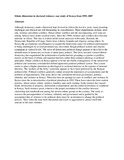| dc.description.abstract | Although democracy made a historical leap forward in Africa the last few years, many
daunting challenges and obstacle are still threatening its consolidation. These
impediments include, inter alia, violence and ethnic conflicts. Hence ethnic conflicts and
the encompassing civil wars are among Africa's most savior societal crises. Since the
1990s violence and conflicts have become endemic in Africa. This fact is evident in the
recent massacre in Rwanda, Burundi, the Democratic Republic of Congo, Sierra leon,
Liberia, Somalia and Algeria, among others. In Kenya the governments unwillingness to
expand the democratic space for political participation is being challenged by several prodemocracy
movement though political actions and citizens campaigns at various levels.
The wave of democratic political change appears to have led to the identification of
democracy in terms of multi-party politics. This drive towards western liberal democracy
has engendered the polarization of particularistic groupings as parties crystallize, mostly
on the basis of ethnic and regional interests rather than common ideology or political
principles.
Ethnic conflicts in Kenya appear to be the inevitable consequences of the unresolved
political and economic contradiction behind apparently partisan political system. This
system seems to place a higher premium on ideological or sectional interests at the
expense of national interests. The "politics of the belly" syndrome appears to have been
perfected by the Kenyan political elite. Political conflicts generally radiate around the
imperative of accumulation and the problem of legitimization.
This study shows the correlation between governance, politics, ethnicity and violence in
Kenya. There has been an upsurge in cases of conflicts and violence In Kenya since the
re-introduction of political pluralism in 1991.These have taken the form student protests,
labour unrest, ethnic violence, banditry and cattle rustling. Such violence has caused
death, destruction of property, dislocation of populations and has added lawlessness to
statehood in Kenya. Such violence poses a threat to the proper resolution of the conflict
between citizenship and statehood and among the diverse ethnic groups in the country.
The study re-assesses the presupposition of violence, ethnicity and governance and it
guided by the assumption that of violence to be political, there must be an intention to
change the political process. Thus when the state feels threatened and resort to aggression
to protect itself this amount to the state violence. | en |

